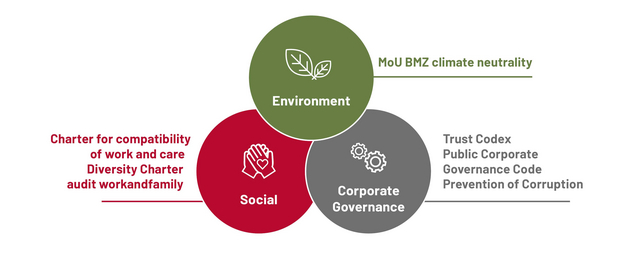Sustainability as a Guiding Principle of Our Work
IDOS is committed to addressing the interplay and mutual interdependence of development and sustainability. Our vision is to contribute to co-shaping a collaborative, multipolar world for sustainable futures. We do so by conducting high-quality research, independent policy advice, and transregional knowledge cooperation and training.
We understand sustainability as a cross-generational challenge with social, economic, ecological, and political dimensions. At the same time, it is a question of transregional justice in the present. Our research spans a broad and dynamic range of topics – from climate change and social inequality to democracy research and multilateral cooperation. In line with the 2030 Agenda, we understand sustainable development as a universal guiding principle for all people around the world.
This fundamental understanding of sustainability also serves as a guiding principle for our own institutional management. We strive to actively integrate sustainable and environmentally conscious practices into our operations and continuously improve them. Our sustainability efforts and commitments include the signing of the Diversity Charter and the Charter for the Compatibility of Work and Care of the NRW State Programme, the TRUST Code for equitable research partnerships, and the certification under the audit berufundfamilie.
Since 2016, the IDOS Directorate / Management has been supported by the Sustainability Working Group on matters of sustainability. Since 2024, a Sustainability Officer has also been supporting the implementation of the Memorandum of Understanding with the German Federal Ministry for Economic Cooperation and Development (BMZ). This declaration lays the foundation for our goal of achieving climate neutrality at IDOS by 2030.
For us, sustainability means acting responsibly and with foresight – economically, ecologically, and socially. We want to make this commitment transparent. IDOS is currently preparing its first voluntary sustainability report in accordance with the German Sustainability Code (DNK), which will include a comprehensive baseline assessment as well as an initial greenhouse gas inventory.

